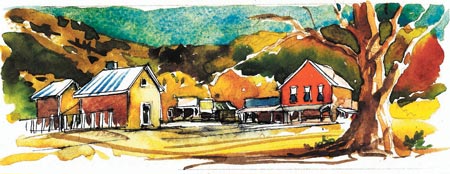Genoa, Nevada’s oldest town, offers scenery, lots of history

Tiny Genoa lies in the verdant Carson Valley at the base of the Sierra Nevada, about 10 miles from Nevada’s capital, Carson City, on Nevada Highway 206. Nevada’s oldest community, Genoa began in 1850 with the establishment nearby of a seasonal trading post along the emigrant trail to the California gold fields.
Returning to Salt Lake City, the original traders met with disaster on the Humboldt River in an encounter with hostile natives. In 1851, a new group of Mormons relocated a permanent post called Reese’s Station, later known as Mormon Station. Trader Israel Mott brought his wife Eliza, the first female non-native settler in Nevada. Before long, folks called the settlement around the station Genoa, pronounced by Nevadans as “gen-OH-ah.”
Today, Genoa bustles with activity, drawing thousands who come to visit Mormon Station State Historical Park and Genoa’s Courthouse Museum across the road. Other sites include a venerable bar, a picturesque graveyard and Walley’s Hot Springs, the earliest such resort in the state, dating from 1862.
Genoa packs a lot of action into the summer season between May and October. Upcoming special events include a Concert on the Green in the city park on July 19, and the 90th annual Genoa Candy Dance on Sept. 26-27. This festival evolved from a 1919 effort selling homemade candy at a dance to raise money for streetlights to a two-day arts and crafts fair added to the original candy dance.
Mormon Station State Park features a 1947 replica of the log cabin trading post constructed after fire destroyed the original. A wooden stockade and Gold Rush-era wagons and other vintage conveyances reflects the site’s origins. The 2.5-acre grounds provide plenty of space for picnics and outdoor gatherings. No entrance fees apply for visiting the grounds. Picnicking at individual sites is free. Visitors aged 13 and older pay $1 to tour the three-room cabin museum furnished in period style. The park remains open daily from 9 a.m. to 4:30 p.m. from May to October.
Among Genoa’s remaining 19th-century buildings, the 1865 former Douglas County courthouse stands out. The handsome two-story brick structure with white trim served the county until 1916, when Minden became the county seat. It continued to serve the county as a school until 1956. Adopted as a project by the Carson Valley Historical Society, the old building reopened in 1965 as a museum. It welcomes visitors free of charge from 10 a.m. to 4:30 p.m. daily from May through October. Donations at the door and the sale of items in the museum bookstore help with maintenance of the fine old building.
The Courthouse Museum features many historical collections, with emphasis on the history of the Washoe people and examples of their finely crafted baskets and other implements. Visitors also enjoy the collections recalling pioneer life and the collections of ranching, farming and mining implements. A typical classroom from the old days shows young visitors how schools used to look. The old-fashioned kitchen exhibit features implements your great-grandmother used.
One of Genoa’s most famous characters receives attention in the Courthouse Museum. An early hero, Snowshoe Thompson carried the mail over the Sierras from 1856 to 1876, using skis to get from Placerville, Calif., to Genoa in the winters, when drifts could be 50 feet deep. Visitors to the museum find out about this brave postman who carried 50-100 pounds of mail, sometimes including vitally needed medicine or replacement machinery parts.
Born in Norway in 1827, Thompson emigrated during the California Gold Rush. He married a girl from Genoa. After his well-attended funeral in the courthouse in 1876, Thompson was buried at the nearby Genoa Cemetery. Visitors to the cemetery look for a gravestone marked with crossed skis to find Thompson’s final destination, joined later by his son and wife.
Genoa boasts other attractions, including a selection of restaurants and a couple of notable bed and breakfast inns. One of Nevada’s oldest bars sits conveniently near the former courthouse, still in operation despite the changes.
Margo Bartlett Pesek’s column appears on Sundays.